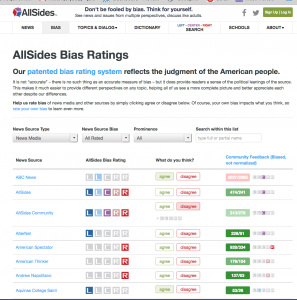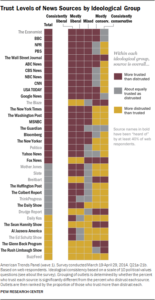TECH TALK: How to get your news from the internet
 ERIC’S TECH TALK
ERIC’S TECH TALK
by Eric Austin
Technical Advisor
Ah, information. The internet has so much of it! In this climate of political chaos, news breaks faster than most of us can keep up. Fortunately, the internet is here to fill our heads with all kinds of wrong information!
While the convenience of the internet is undeniable, information no longer comes with the guaranteed editorial oversight of a print newspaper or magazine. That means more of the responsibility is on us, as consumers, to discern good information from bad. This is particularly true of current news, as it is often reported before all the facts are in.
In this week’s column, I’d like to convey a few tips I rely on to sift through all the information on the internet and figure out what’s really going on!
Know Your Bias. Everyone has a bias, and every source has one as well. It’s inescapable and unavoidable, but as they used to say on Saturday morning cartoons when I was a kid: Knowing is half the battle. Be aware of how your own bias might color your perspective and dictate which sources of information you gravitate to. Purposely expose yourself to the other side — if for no other reason than so you can understand what information other people are using to reach their own conclusions.
There are a number of resources online that examine bias in the media. AllSides.com is a multi-partisan, crowd-sourced website that examines bias in the media and tries to present multiple perspectives of controversial issues. Journalism.org, a site sponsored by the Pew Research Center, is another good resource.
Use Multiple Sources. The great thing about the internet is how easy it is to check multiple sources for a broader perspective. Once you’ve identified which way your preferred news outlet leans, take a look at a respected source that leans in the other direction!
But don’t just stop there! Check out some of the English-language news outlets from around the world, like BBC News and the Middle-Eastern Al Jazeera. It can be enlightening to hear what journalists and pundits outside America have to say about us and the conflicts in which we’re embroiled.
YouTube is a great resource for checking out a variety of sources, as most of the major networks have channels on Google’s video site. Everything is uploaded as three to five minute clips of a particular news item, so it’s easy to add news clips from multiple sources to your “Watch Later” playlist for back-to-back viewing.
Independent, internet-only news stations have also blossomed, especially if you’re interested in what the younger generation is talking about and listening to. The Young Turks and Democracy Now! are two of the most popular and each have channels on YouTube.
Don’t just get your news from Facebook! According to a recent article in Slate magazine, 44 percent of Americans primarily receive their news from the giant social media site. However, it’s easy to miss the source of an article when reading it on Facebook, and knowing the source of a particular bit of information is your greatest asset in determining if it is valid.
Facebook also tends to emphasize headlines and minimize context. This encourages us to have gut reactions to news rather than contemplating it thoughtfully, and encourages news sources to present the most salacious headline in an effort to capture more clicks.
And your Facebook feed is designed to give you more of what you ‘like.’ Facebook has a vested interest in showing you things in which you’re interested and will cater to your existing views. Every time you ‘like’ a news item someone shares, that preference factors back into Facebook’s algorithms in order to more finely tailor your feed. This subtly warps your views based on the news Facebook assumes you most want to see.
Bookmark some fact-checking sites. If you follow my advice, you might be dismayed to find a lot of conflicting reports, based on where you go for your information. Enter fact-checking sites. PolitiFact.com is a website maintained by the Tampa Bay Times in which reporters and editors evaluate statements made by politicians, pundits and media outlets. They were awarded the Pulitzer Prize for National Reporting in 2009, and have a great format that allows you to fact check by politician, news channel (ABC, CBS, NBC, CNN, and Fox), or political pundit. But prepare to be shocked when you learn how often your favorite talking head makes inaccurate or outright false statements!
Like in everything else, checking multiple sources is your best bet in evaluating truth, so also visit FactCheck.org, The Washington Post’s “Fact Checker,” and Snopes.com which looks at the veracity of rumors and urban legends circulating the internet.
Finally, know the difference between news and opinion. Good sources will make it clear which stories are straight news and which are opinion pieces. Know which is which before you start reading!
In this day and age, separating true information from false can be challenging. But if you follow these tips, you’re more likely to have an informed and balanced view of the world around you! Good luck!
Have a comment on something you read? Know of a resource I failed to mention? Let your voice be heard on townline.org or email me directly at ericwaustin@gmail.com!
Responsible journalism is hard work!
It is also expensive!
If you enjoy reading The Town Line and the good news we bring you each week, would you consider a donation to help us continue the work we’re doing?
The Town Line is a 501(c)(3) nonprofit private foundation, and all donations are tax deductible under the Internal Revenue Service code.
To help, please visit our online donation page or mail a check payable to The Town Line, PO Box 89, South China, ME 04358. Your contribution is appreciated!





Leave a Reply
Want to join the discussion?Feel free to contribute!